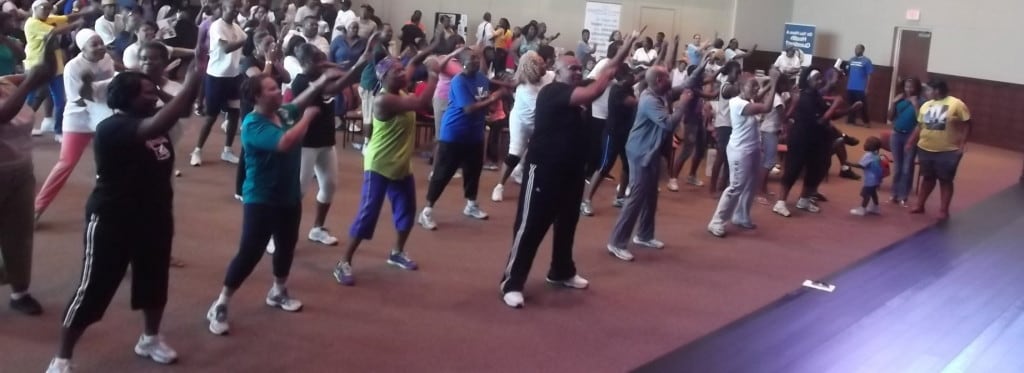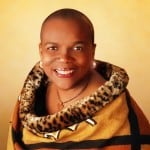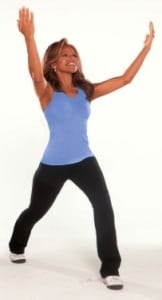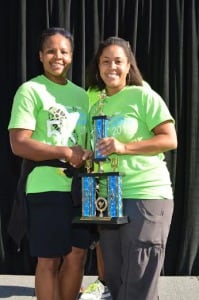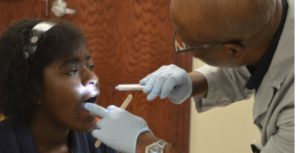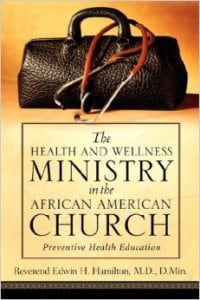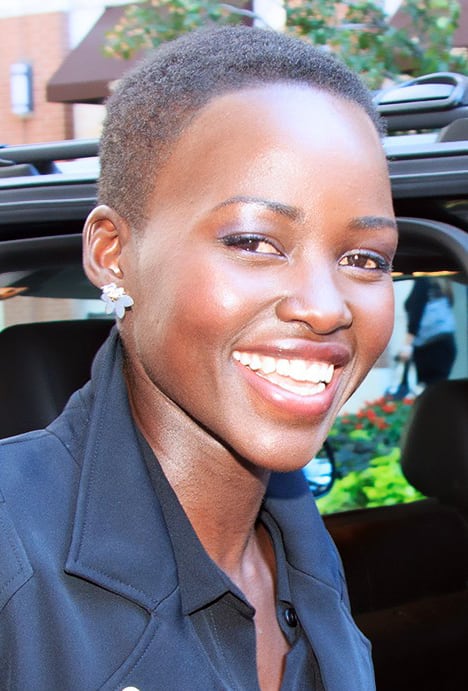Betsy Adeboyejo was fed up. She had tried everything to lose weight —Weight Watchers, corporate competitions, New Year’s resolutions.
“It was all a bust,” remembers Adeboyejo, 43.
So the married mother of two decided to do her church’s weight-loss program called God’s Way to Weight Control and lost 10 pounds.
“I tried God and His word and it worked,” says Adeboyejo, owner of Acres of Grace, a marketing and communications firm in Washington, D.C.
If your New Year’s goal to lose weight, get in shape or live a healthier lifestyle, you, too, may be able to get some help from your local church.
Health ministries are becoming more common in African-American churches. Today, many houses of worship not only offer spiritual guidance but also have programs on keeping your temple — physical and mental — healthy.
Studies have shown that black churches have the “ability to promote health and prevent disease.” They offer a sense of community and support in a faith-based environment. For example, some churches do a fast at the beginning of the year, many have health fairs and others provide periodic preventive screenings.
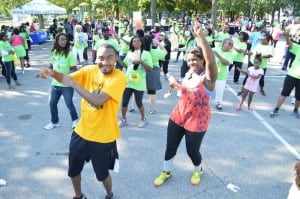
More churches are saying “Amen” to physical and mental health. (Photo credit: Blue Cross Blue Shield of Michigan)
Nearly 90 percent of respondents in a 2013 study published in Health Promotion Practice said that churches had a responsibility to promote healthy living. This is a responsiblity that a growing number of churches have been taking seriously, delving deeper into once taboo topics ranging from HIV/AIDS to mental health. (See sidebar below, “The Perfect Combination: Churches Learn That Prayer Plus Therapy Heals.”)
In the study, more than two-thirds of respondents said that their churches had “very active” health ministries. And according to the lead author, Adebowale A. Odulana, M.D., of the University of North Carolina at Chapel Hill, that’s how they prefer to get their health messages — not from the pulpit.
Through the 12-week program at Betsy Adeboyejo’s church, From the Heart Ministries, participants met weekly and learned how to prepare healthy meals and snacks and eat in moderation. Adeboyejo says her biggest take away was to be organized and plan ahead.
The program was simple if you stuck with it, just like God’s word, she says.
“There wasn’t a pre-prescribed formula whereby if you pray God would take the weight away,” Adeboyejo says. “It was more of a discovery of who I am from God’s perspective that helped me to put the fork down.”
More than a decade later, Adeboyejo has been able to keep the weight off by incorporating knowledge from the program in her daily life.
“I learned that it’s not really about what program you’re on, it’s about how you think about food and its purpose,” she says. “We have to take responsibility for our temple (our body) and strive to glorify God in, with and through it.”
Below are a few examples of churches that have active health ministries along with other resources to expand or develop one at your place of worship:
Let’s Move!
The Health and Wellness Ministry at Alfred Street Baptist Church in Alexandria, Va., sponsors blood drives, flu clinics, blood pressure screenings, mammogram testing and an annual health fair. The ministry’s Let’s Move Day encourages members to engage in regular physical activity.
AIDS Warrior
Since 1989, Pernessa C. Seele has been pushing churches to become more involved with HIV/AIDS outreach. She is the founder and CEO of Balm in Gilead, which has engaged 30,000 faith institutions worldwide, including Alfred Street Baptist Church. The annual National Week of Prayer for the Healing of AIDS will be held March 2 to 9.
What’s Up Doc?
The Health Ministry at Full Gospel Baptist Church in Atlanta makes sure that each member of the congregation has a primary-care physician. Church members also participate in an annual HIV/AIDS 5K run-walk, which is held before a conference on the disease.
Holy Hypertension
In Baltimore, Bethel AME Church checks blood pressure after each service. Last year, its members squared off against the Empowerment Temple’s congregants in a battle of the fittest.
‘I’m Walking; I’m Walking!’
Sickle cell anemia, breast cancer, diabetes, kidney disease — you name it, and the members of New Gideon Baptist Church are walking all over Baton Rouge, La., to conquer it. They’re also up bright and early at 7 a.m. on Saturdays to trek around Independence Park. Plus, the church has organized signup sessions for the Affordable Care Act.
Donna Richardson Joyner takes her Body Gospel message from coast to coast working with a variety of churches, communities and individuals. Her Sweating in the Spirit was the No. 1 inspirational video. Now she has a best-selling book, Witness to Fitness, with a 28-day wellness program.
Healthy and Whole
Bishop T.D. Jakes offers a range of programs at The Potters House in Dallas, including nutritional services, personal training, life coaching, a counseling center and Fit Life singles-only workouts.
Preventing Disease
Second Baptist Church of Detroit holds quarterly “Healthy Mind, Healthy Body, Healthy Spirit” sessions and distributes health-related literature to its congregation. The health ministry also conducts disease prevention activities throughout the year.
Spiritual Sparring
In recent years, the Blues Community Challenge has sparked spiritual sparring among 27 churches in Grand Rapids, Mich. But the good-natured trash talking paid off with New Hope Baptist Church earning this year’s grand prize. Nearly 700 members of New Hope as well as 14 other churches, ranging from Brown-Hutcherson Ministries to New Life Tabernacle, collectively logged 127,000 miles in physical activities. The 12-week program culminated at a ceremony during the Grand Rapids African American Health Institute Rhythm Run at Martin Luther King Park in August. The challenge began in 2009 through a partnership that has included the American Cancer Society, the American Diabetes Association and Blue Cross Blue Shield of Michigan.
Beyond the Three Rs
St. Mark Baptist Church in Little Rock, Ark., sends its younger congregants back to school with backpacks and school supplies, whether they’re in preschool or college. The church also offers them free physicals, vision and dental screening, and immunizations. Plus, aerobics classes are held on Tuesdays and Thursdays.
Good Grief
That’s the name of the grief and bereavement ministry at Abyssinian Baptist Church in New York. The ministry helps Harlemites prepare for the death of a loved one and walks them through the healing process.
Fit for Life
True Vine Ministries in Oakland, Calif., offers quarterly health forums and programs to help members with their mental and physical wellness, including a program for cancer survivors. It also sponsors a six-week healthy lifestyle program called Fit for Life.
Lottie Joiner is a writer based in Washington, D.C., and senior editor of The Crisis magazine, published by the NAACP.
Starting or Growing a Health Ministry at Your Place of Worship
The Health and Wellness Ministry in the African American Church by Edwin Hamilton (Xulon Press, 2004)
Here are a few resources to help your place of worship develop or expand a health ministry:
African-American Churches Eating Smart and Moving More: A Planning and Resource Guide — published by the North Carolina Department of Public Health.
Body & Soul — a wellness guide for African-American churches developed by the National Cancer Institute and the American Cancer Society. Temple University’s Office of Health Communications and Health Disparities in Philadelphia has been a major coordinator of the program in the Mid-Atlantic region.
Health Ministries Association — a national organization that “encourages, supports and empowers leaders in the integration of faith and health in local communities.” The association is made up of faith community nurses, health ministers, program leaders and spiritual leaders who have health ministries at their places of worship.
The Perfect Combination
Churches Learn That Prayer Plus Therapy Heals
By Lottie L. Joiner
Four years ago, Myra Andrews thought she had postpartum depression. She was sensitive, crying a lot and had become withdrawn. But her daughter was 2, so she couldn’t be postpartum, her doctor told her. She didn’t know what was wrong. The 43-year-old Atlanta resident was eventually diagnosed with bipolar disorder and severe depression after a suicide attempt. She was hospitalized briefly and required to attend therapy and counseling as a condition of her release.
But Andrews was hesitant to participate in the therapy because of her Christian upbringing.
“I was brought up to believe that I’m a strong black woman,” Andrews says. “I can handle everything. God’s not going to put more on my plate than I can handle and that I shouldn’t need any help. God’s going to take care of it.”
According to the National Alliance on Mental Illness (NAMI), African Americans are more likely to turn to family, religion or friends for emotional support rather than a health care professional. The organization found that cultural biases against mental health professionals prevent African Americans from accessing care. Social sensitivity was also a factor. NAMI notes that only 2 percent of psychiatrists, 2 percent of psychologists and 4 percent of social workers are black.
Learning That Mental Health Is a Disease — Like Diabetes or Cancer
Andrews, a divorced mother of three, eventually went to group therapy sessions where she opened up and got additional help with one-on-one counseling. But it took some convincing. First she had to learn that mental illness was a disease, not a personal failing.
“My doctor had to take me through a lot to get me to understand mental illness,” Andrews says. “It is an illness — the same as if someone was a diabetic, the same as if somebody has cancer.”
Unfortunately, her family and church community don’t see it that way. She’s been described as weak and accused of lacking of faith.
“They told me that what I had was the enemy attacking me and I needed to pray harder about what’s going on,” Andrews says.
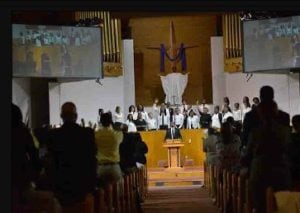
Alfred Street Baptist Church supports mental health services and sponsors a range of health programs.
This kind of thinking recently led the Rev. Howard-John Wesley, pastor of Alfred Street Baptist Church in Alexandria, Va., to do a sermon on mental illness. He says mental illness is not talked about enough in the black church and called for a community of caring and compassion, a place where people aren’t stigmatized or judged. It’s a different approach than the one he witnessed growing up as a black Christian.
“We deemed anyone who went to see a psychiatrist as someone who was crazy or someone who was weak,” Wesley said. “That is until it hits your door, and it hit my doorstep.”
The pastor sought counseling after his father’s death and has been open about his therapy sessions. During his sermon, he encouraged the use of mental health professionals for those struggling with troubling days.
“I’ve seen those come into the office who needed much more than I was able to give. And I think we still have a perception in the black church, ‘I’m just going to talk to my pastor,’” Wesley says. “Well, the complexity of life is much greater than my understanding. I can’t simply say the best thing I can do for you as a pastor is pray. The best thing I can do is help you find a psychologist or therapist or psychiatrist who can give you better help than I can.”
That’s why Laverne Williams created the Promoting Emotional Wellness and Spirituality (PEWS) program eight years ago. As the community outreach coordinator for the Mental Health Association in New Jersey, Williams noticed that communities of color were not accessing mental health services. She knew the church was a good place to reach African Americans.
“I’ve been in church all my life,” Williams says. “For a lot of us, that’s where we go for health and healing.”
Blending Psychology and Theology
The PEWS program pulls together the worlds of psychology and theology. Williams reaches out to congregations and conducts workshops on the relationship between emotional wellness and spiritual wellness. The presentations include a video Williams produced called Anything But Crazy: African American Spirituality and Emotional Wellness. There’s also a manual for churches that are interested in having a PEWS ministry.
“A lot of times in the faith community, we’re advised to read our Bible, fast and pray, come to the altar, lay some hands on you, get some blessed oil, but if you’re hearing voices you need some medication,” says Williams. “The message is you would not go to your foot doctor for your eye. The PEWS program is like giving folks in the faith community a license to say it’s OK to go see a psychiatrist.”
Williams also conducts conferences several times a year in which religious leaders and mental health professionals learn how they can work together on mental health issues. Religious leaders are taught to identify the signs of mental illness, and counselors are schooled in how to discuss their clients’ spiritual beliefs. Participants also leave with wellness-and-recovery action plans, often called “wrap” services.
Williams and others in the mental health community know all too well how black churches have historically viewed mental illness. But they also understand the important role of the black church in the African American community.
“If you are in the black community, no matter where you come from, an affiliation with a church at some level is inevitable,” says Harold Turner, director of programs for NAMI Urban Los Angeles, which works with mostly African American and Latino populations. “It is one of the few organizations that is functional in our community, and it’s probably the only organization that comes with a built-in credibility.”
That’s why NAMI Urban LA has made partnering with churches part of its approach in reaching families who care for members who are mentally ill. Churches help in doing outreach and providing an understanding environment for families affected by mental illness, Turner says. NAMI Urban LA trains pastors and spiritual leaders on how to address mental health issues at their churches.
“Mental illness is not a moral issue,” Turner says. “It’s not a character flaw. These are biological illnesses, just like diabetes, heart disease, anything else. And when people are afflicted with this, they need to be referred to the appropriate resources, and we try to [assure] them that we understand the role of spirituality in their family and in the person who is ill as well.”
In the past few years, NAMI Urban LA has collaborated with 17 ministries throughout the southern Los Angeles area, including the West Angeles Church of God in Christ, which has a counseling center for its more than 30,000 members, and the Los Angeles Shabach Foursquare Church.
For those looking for faith-based counseling nationwide, look at the NAMI FaithNet page, which includes a list of faith-related support groups and mental health ministries.
Coming Out of Hiding
“In the black community, one of our problems is we tend to hide from things we think are shameful. Mental illness happens to be one of those things,” says Ramona Jackson-Woods, co-pastor at Los Angeles Shabach Foursquare and one of five people at the church certified to facilitate NAMI Urban LA programs.
Woods says the NAMI programs offer tools and resources that help the church be more effective in helping families become more comfortable with the idea of mental illness so that it’s not a mystery. The tools and resources work well with the church’s “inner healing” ministries, says Jackson-Woods, in which they provide small-group therapy as well as one-on-one counseling.
“The black church is still influential,” Jackson-Woods says. “Whether or not folks attend, they still seek and look to leadership in the black church.”
Today Andrews, the divorced mother, is on disability and takes medication for her illness. She is looking for a holistic therapist who can incorporate her Christian beliefs with therapy. In the meantime, she’s found support from the Black Women’s Depression board, a private online Yahoo! group. But she wishes that more black churches were understanding of those with mental health issues. She knows she’s not alone in needing their help.
“There are a lot of people going through things,” Andrews says.
Gayle Porter, Ph.D., a psychologist and co-founder of Prime Time Sister Circles, a 12-week program for middle-aged black women that focuses on physical and emotional wellness, says prayer is the primary method that many women use to deal with stress, anxiety or depression. She says the black church can be a powerful vehicle to help people get appropriate professional support for their mental health issues.
Just as many black churches now have fitness or weight-loss programs, Porter points out they can also work with mental health providers to provide emotional help.
“It is time for us to combine our resources and form a partnership between black churches and mental health providers,” Porter says, “reinforcing the idea that prayer and therapy are a wonderful combination.”


